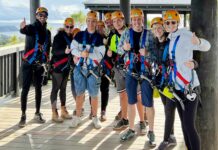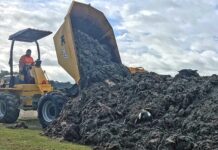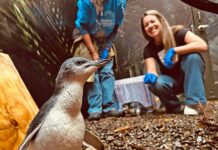Fiona and Paul Hailstone were settling in for the evening at their Burrell Road Extension home last Saturday when a loud screech outside got their attention.
As the racket continued they went to investigate and found a kaka in a shrub at the front of their property.
“It dropped out of the hedge and walked across the ground with its wing out” says Paul. Sensing something was wrong, they dropped a net over the trailer it had taken refuge under and called Karen Saunders of Native Bird Rescue (NBR). A neighbour’s cat lingered nearby but is not thought to be the cause of the injury.
When Karen got the call she was enjoying some rare time out from her paid job and volunteer work with NBR. It has been a busy patch for the volunteer team with 22 birds admitted since 1 July compared to 80 for the whole year to 30 June.
“We were full up but how can you say no to an injured kaka? They are rare and there is the risk of bites for others who might handle the bird. They have very sharp beaks that can cut to the bone.”
By 8.30pm Karen’s night off had been transformed into a dash to catch the injured native parrot in Oneroa and then take it to veterinarian Bryan Gartrell at Orapiu for examination. A broken wing was almost certain but an x-ray was needed to confirm it. Pain relief was given and a dressing applied.
The decision was made to take the bird to the surgical team at Auckland Zoo on Sunday morning. Usually such bird transfers are made unaccompanied (with Fullers help) in a cardboard box. But that would be no match for its beak so this time the kaka went with an escort in a shrouded metal cage.
The broken wing was confirmed and the parrot underwent surgery on Tuesday morning at Auckland Zoo. A team of two veterinarians and a nurse operated for over two hours in a complex operation that involved inserting metal pins for a break at the socket.
The pre-surgery assessment was positive – the bird was alert and had good vital signs – but the recovery phase will be critical. All going well after recuperation the kaka will be returned to the island for release back into the wild. • Rob Brennan







